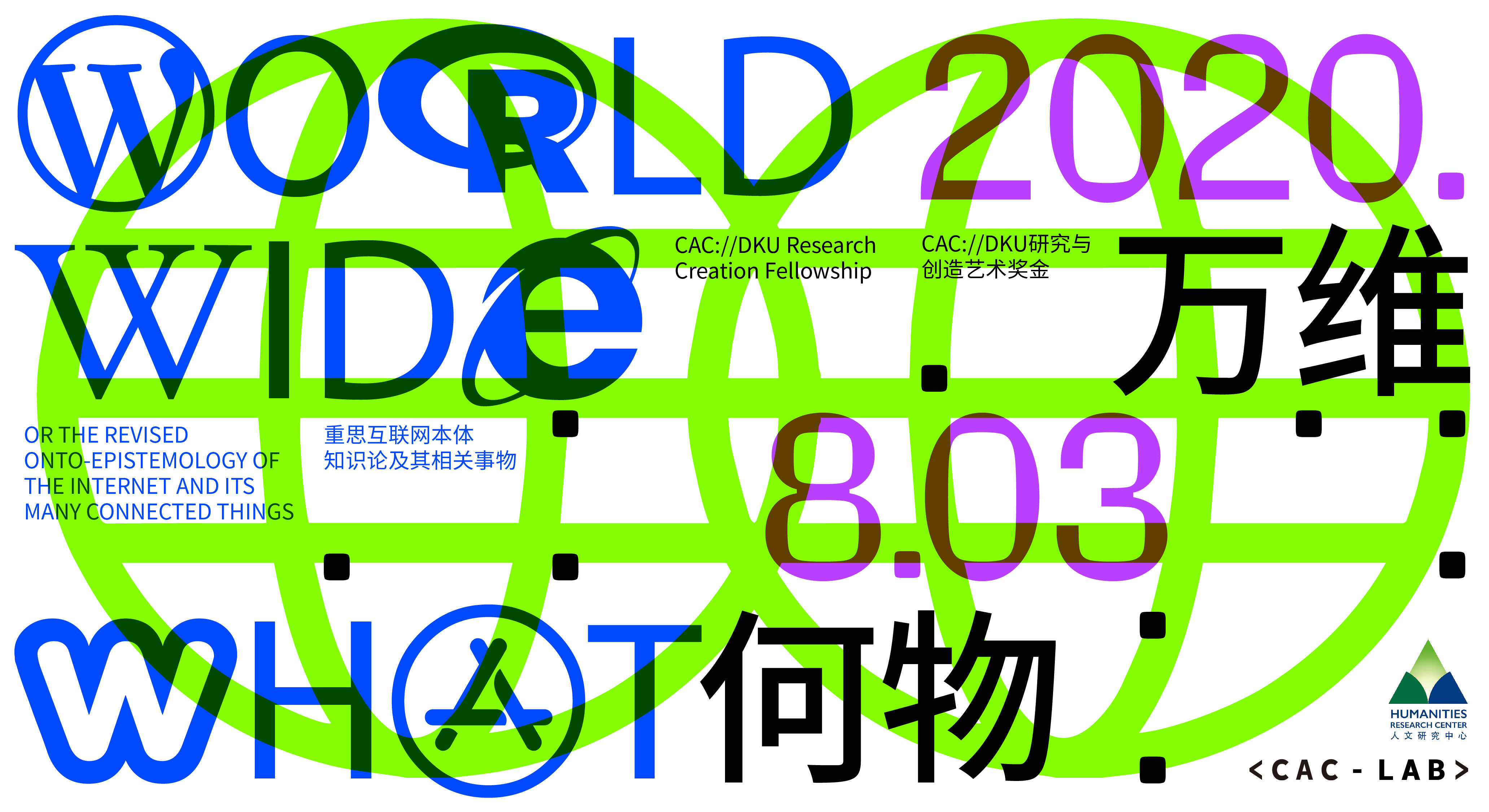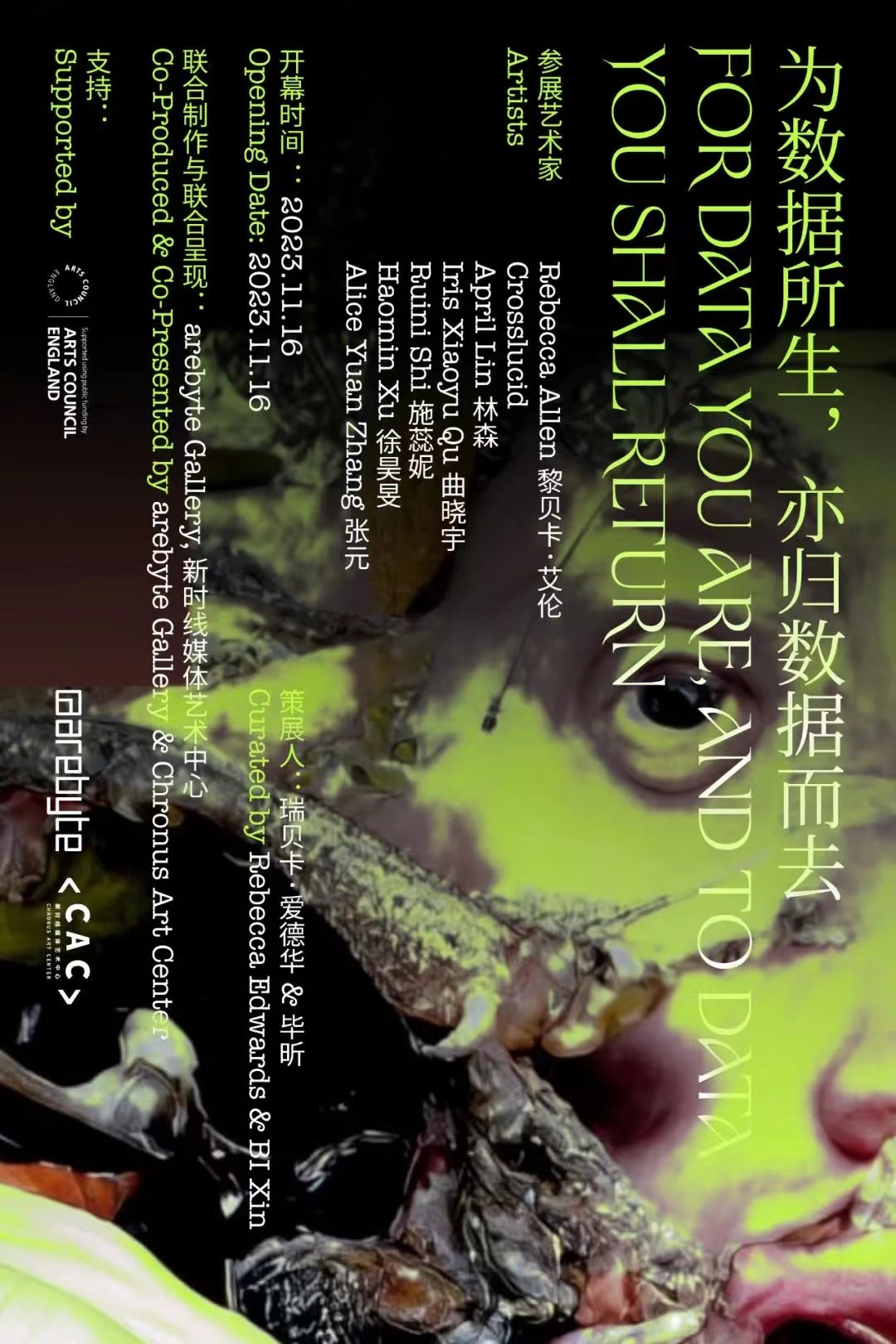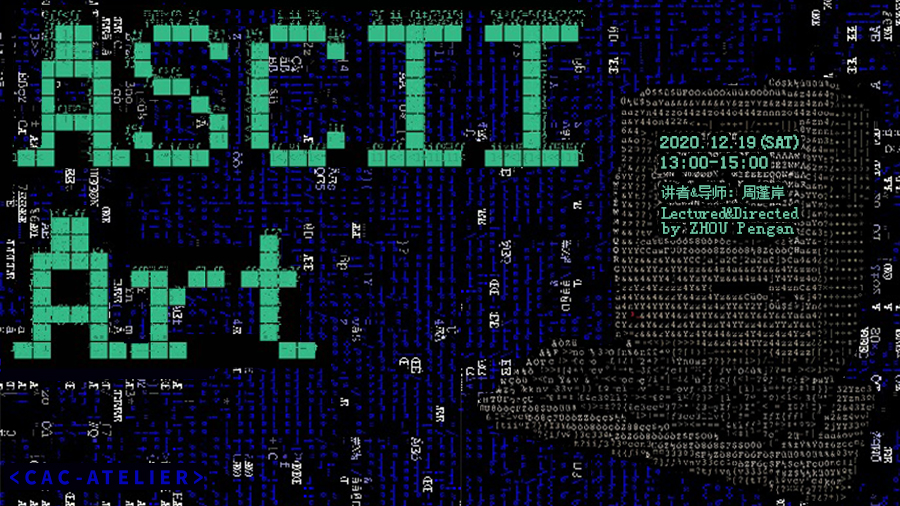
Chronus Art Center (CAC)
CAC://DKU 2020 (Fall) Research & Creation Fellowship
Call for Proposals
Title: WWW – World Wide What, or the Revised Onto-Epistemology of the Internet and its Many Connected Things
Call Type: Fellowship (US$10,000)
Application Deadline: All applications must be submitted electronically by 23:59 (Beijing Time), Monday, August 3rd, 2020 via http://fellowship.chronusartcenter.org
Notification of Selection: Applicants will be informed about their application status in late August, 2020
Start Date: October 2020 (starting date negotiable within reason)
Duration: Three months
< OVERVIEW >
Chronus Art Center (CAC) and Duke Kunshan University (DKU) are co-hosting their first 3-month Research and Creation Fellowship. The program is designed for international artists and researchers in the area of media art and related domains, taking place at Chronus Art Center’s Research/Creation Lab (CAC Lab) in Shanghai, and Duke Kunshan University’s Humanities Research Center (DKU HRC), Kunshan, China. The 2020 Fall Research and Creation Fellowship aims to foster global exchange, advancing the discourse and practice of media art, and contributing to both institutions’ research and educational mission and future collection.
Previous fellows: http://lab.chronusartcenter.org/fellowship/?lang=en
WWW – World Wide What, or the Revised Onto-Epistemology of the Internet and its Many Connected Things
If the internet did not exist, there would be no social media to connect us, no remote learning to teach us, no online team meetings to keep us functioning or streaming platforms to entertain us. Equally, there wouldn't be devices 'overhearing’ conversations, exploitative data mining and online surveillance, less fake news and trolling. Also, no info-sec makeup tutorials discussing social politics, privacy, and collective responsibility.
Will the internet — everything it is, and everything it is connected to — help develop a more nuanced vocabulary for freedom as a byproduct of the pandemic and other simultaneous crises? As the world stays home and spends more time online than ever before, might the world wide web become a supra-state-galore, a cyber hippy-oasis, finally achieving the collective sentiments of trust and usefulness that were promised at its birth? Or perhaps increased usage will merely further coerce users to participate in the acceleration of algorithmic and surveillance capitalism? Or maybe the status quo will remain and online meeting platform stocks will soon plunge into the same abyss that memes go to die in.
In recent weeks — a short time even for technology — the internet has been altered substantially; from new or significantly improved digital tools, to connected devices such as voice assistants staking their claim to dominance where touch has become an occupational hazard. Meanwhile, data centers melt ice sheets at an accelerated rate, accommodating knowledge sharing, culture, and relationships.
As we ponder reopening, a return to normality approaches and our online time will drop. What will we make of this time? When the 5G towers stop burning, will they help address the digital divide, or further amplify it? Will there be, even if it's tiny, a renaissance of the World Wide What, and what might it look like?
We invite artists in critical media art and design, and related domains, whose practice deals with the intersections of the politics of media, digital infrastructure and ecosystems, and promote collective visions for the Internet in its many forms. Relevant proposals might want to address disparities in online access, digital infrastructure and its hunger for resources, promises and caveats of AI, tradeoffs between digital privacy and convenience, blockchain and open-source, internet of things past optimisation. Digging the roots (futuristi, cyberdelics, cyborg feminists, etc.) through to the present (‘rebuilding the internet’) and encompassing roadmaps emerging from different perspectives (i.e. Afro-/Sino-futurism), we expect functional, experiential extracts of the WWWhat.
< ELIGIBILITY >
- The program is open to all nationalities, genders, social and racial backgrounds.
- Applicants must not be currently enrolled in degree-granting academic programs, with the exception of PhD candidates aiming to develop technical work within the scope of the Fellowship program.
- Only applications submitted in English will be considered.
- Individuals or collectives are welcome to apply. Please make sure to specify how technical and creative responsibilities will be met. Note that the same funding conditions apply independently of the number of applicants.
< EXPECTATIONS >
- Taking into account our potential interest to showcase the results of the Fellowship, projects will be expected to be completed or presented as advanced functional prototypes by the end of the program.
- The selected Fellow(s) will be expected to reside in the Shanghai - Kunshan area, with occasional transfers between the two cities.
- Aside from their main project, Fellow(s) will be expected to contribute to a range of activities conducted at CAC and DKU. Such contributions might involve participating in relevant events and presenting work at CAC, DKU, and partner institutions, collaborating with faculty members and students at DKU, leading research initiatives, masterclasses, educational and public engagement initiatives.
- Specifically, the Fellow will be expected to teach at least one masterclass at DKU, and to be present on campus for at least (the equivalent of) two weeks, in order to allow time for engagement with the students and faculty members. Presentations at DKU will be highly encouraged to allow students to have close and hands-on experience with the artist and their work.
- Work-in-progress, prototypes, and documentation related to the development of the project will be presented to the public at Chronus Art Center and at the DKU Campus, as well as (where possible) made available online and open-sourced.
< SUPPORT >
The selected Fellow(s) will be offered a total amount of USD$10,000 for a 3 month period, including artist fee, visa application, travel and accommodation, living expenses, and production.
Fellow(s) will be granted full access to CAC Lab’s facilities and tools, and some of the DKU facilities upon advanced agreement.
For international Fellows, we are happy to provide supporting travel documents (official letter of invitation) and assist in the process of securing a visa, travel and accommodation recommendations, and bookings.
We will assist the Fellow(s) to see their project realized. We will also facilitate joint presentations alongside community partners, host conversations with the Fellow(s) and showcase their work in progress, shedding light on the creative process.
< APPLICATION GUIDELINE >
Please fill out the online application form and submit it with the necessary attachments via http://fellowship.chronusartcenter.org. Incomplete or email-sent submissions will not be taken into account.
Proposals should include:
- A clear description of the envisioned idea
- Conceptual background
- Technical framework and specifications
- Sketches, renders or other relevant audiovisual materials.
- Preliminary production timeline
- Budget allocations.
Taking into account CAC’s potential interest to showcase the results of the Fellowship as part of the public program, projects will be expected to be completed or presented as advanced working prototypes by the end of the Fellowship.
< EVALUATION CRITERIA >
Applications will be reviewed and the final decision—including interviews—will be made by CAC's International AdvisoryBoard comprised of leading scholars, artists, and museum professionals. Acceptance will be based on the overall quality of the proposal and its potential to contribute to CAC_LAB's broader research endeavors.
For further inquiries, please email: fellowship@chronusartcenter.org
< ABOUT THE HOSTS >
<CAC_LAB> is a space dedicated to the inquiry of present-day matters regarding art, design, science, technology and their impact on global contemporary culture and society. Through artistic practice, technological tools and research methodology, we enable creative processes that result in works of art of high production and academic value. <CAC_LAB> is a space of flux which encourages artistic practice as a generator of new knowledge, a territory where art and science converge into a contemporary and experimental field of academic research; free from mainstream cultural thought, technological stress and economical diversions.
More info at: http://lab.chronusartcenter.org
CAC: http://www.chronusartcenter.org/en/
Duke Kunshan University Humanities Research Center (HRC) promotes research and creative expression in the arts and humanities, and encourages interdisciplinary efforts. Working in close partnership with Duke’s Franklin Humanities Institute, the HRC functions as a key research bridge between faculty and students at Duke and DKU. In addition, the HRC facilitates co-curricular research training, treating the entire DKU campus as a laboratory for humanities research.
https://sites.duke.edu/dkuhumanities/




